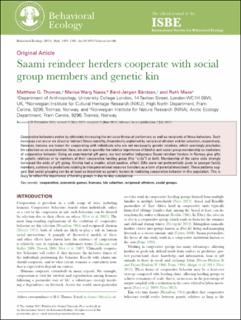| dc.description.abstract | Cooperative behaviors evolve by ultimately increasing the inclusive fitness of performers as well as recipients of those behaviors. Such increases can occur via direct or indirect fitness benefits, theoretically explained by reciprocal altruism and kin selection, respectively. However, humans are known for cooperating with individuals who are not necessarily genetic relatives, which seemingly precludes kin selection as an explanation. Here, we aim to quantify the relative importance of kinship and social group membership as mediators of cooperative behavior. Using an experimental gift game, we test whether indigenous Saami reindeer herders in Norway give gifts to genetic relatives or to members of their cooperative herding group (the “siida”) or both. Membership of the same siida strongly increased the odds of gift giving. Kinship had a smaller, albeit positive, effect. Gifts were not preferentially given to younger family members, contrary to predictions relating to intergenerational resource transfers as a form of parental investment. These patterns suggest that social grouping can be at least as important as genetic factors in mediating cooperative behavior in this population. This is likely to reflect the importance of herding groups in day-to-day subsistence. | en_US |
